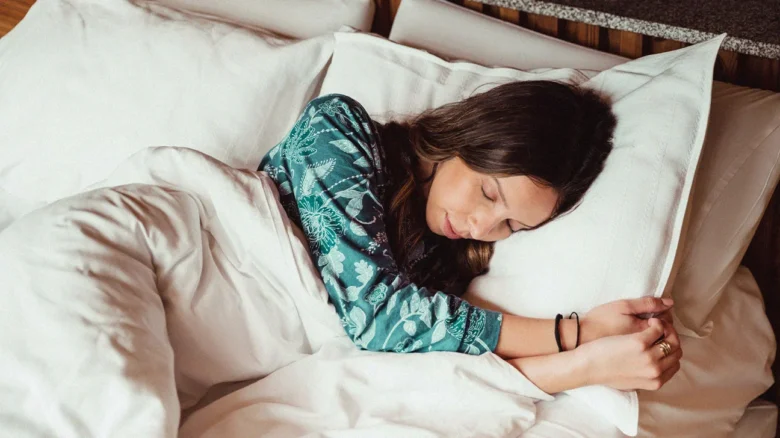Sleep is an essential part of your daily health, but it’s often overlooked in our busy lives. Many people struggle to stay asleep, have trouble staying asleep, or wake up feeling restless. The good news is that simple adjustments to your daily routine can significantly improve your sleep quality. Developing habits that support your physical and mental well-being can help you sleep more deeply and restfully. This can impact your energy, mood, and overall well-being. The first step to a better life is understanding how healthy habits affect your sleep.
How a Regular Sleep Schedule Works
Maintaining a regular sleep schedule is one of the best ways to improve your sleep. Going to bed and waking up at the same time every day helps maintain your circadian rhythm (your internal clock). When you go to bed at the same time every night, your brain learns to release sleep hormones at the right times. This makes it easier to fall asleep naturally. Going to bed and waking up at the same time every day can help you sleep better, even on weekends or days off. This regimen can help you feel less groggy in the morning and more alert throughout the day.
How Evening Habits Affect Your Sleep
The hours before bed are crucial for a good night’s sleep. A nighttime ritual that promotes relaxation can signal your brain that it’s time to wind down. Reading, doing light stretches, or listening to soothing music can help you unwind and prepare for sleep. On the other hand, scrolling on your phone, watching intense TV shows, or working late can overstimulate your brain and keep you awake. Developing a nighttime ritual that prioritizes rest can help you fall asleep more easily.
Why Daily Exercise Is Important
The quality of your sleep is directly related to how much you move during the day. Regular exercise, such as brisk walking, yoga, or strength training, can reduce stress, improve your mood, and help you sleep better. But the timing of your exercise is also important. Vigorous exercise right before bed can make it harder to fall asleep, but exercise earlier in the day can help you feel more energized and sleep better. Incorporating light exercise, such as stretching or walking, into your daily routine can help you sleep better.
Food Choices and Their Impact on Your Sleep
Your diet can also affect your sleep quality. Overeating, consuming caffeine, or indulging in sugary snacks in the evening can make it difficult to sleep because they provide energy when your body should be resting. Instead, a balanced diet consisting of whole foods, vegetables, fruits, and lean protein can keep you energized all day and help you unwind in the evening. Chamomile and lavender are two herbal teas that many people enjoy drinking before bed to help them relax. One of the most important things you can do for your health every day is to eat foods that are good for your body. This will help you sleep better.
The Importance of Mental Health for Sleep
Stress, worry, and a busy mind are some of the biggest factors that hinder a good night’s sleep. Meditation, journaling, and deep breathing exercises are all great ways to calm your mind before bed. If left unaddressed, stress can keep your thoughts racing all night, making it harder to fall asleep or stay asleep. Incorporating relaxation exercises into your daily routine can help you feel calmer, and that calmness can last well into the night. The mind, like the body, needs care and attention to get enough rest.
Creating a Sleeping Space
Your sleeping space significantly impacts your sleep quality. A dark, quiet, and cool bedroom helps you sleep better and longer. Small changes, like using blackout curtains, reducing noise levels, or choosing comfortable bedding, can make a big difference. Avoiding bright lights and electronic devices at night helps your body produce melatonin, a hormone that makes you sleepy. A clean and tidy environment also helps you relax, making your bedroom a place of tranquility rather than tension. Creating a sleep-friendly environment is a simple yet effective health habit.
Balancing Technology and Sleep
Technology is an essential part of our daily lives, but it can also disrupt our normal sleep cycle. The blue light from phones, tablets, and computers can block melatonin production, making it difficult to fall asleep. To ensure a good night’s sleep, limit your technology use. For example, turn off devices an hour before bed. Instead of staring at screens late at night, focus on non-electronic activities like reading or listening to soft music. This can help you relax. Balancing your technology use with healthy habits can help you develop a healthy and restful routine.
Conclusion
Healthy daily habits are crucial for better sleep. From a regular sleep schedule and restful nighttime activities to moderate exercise, relaxation, and a comfortable environment, every habit can help you sleep better. Making small changes regularly can have a giant impact on your health, well-being, and energy levels during the day. Better sleep isn’t just a matter of happiness; it’s also a reflection of how you care for your physical and mental health during the day. You can live a better and more balanced life by prioritizing healthy habits. This makes a good night’s sleep part of your daily routine.
FAQs
1. Why is it so important to maintain a regular sleep schedule?
A regular sleep schedule helps keep your internal clock in sync, making it easier to fall asleep and wake up naturally.
2. Which foods can improve your sleep?
Light, nutritious meals and relaxing beverages like herbal tea can help you relax. Avoiding coffee and heavy meals in the evening can also help improve your sleep.
3. Does exercise really help you sleep?
Yes, regular exercise can reduce stress and improve your sleep, especially if you do it early in the day.
4. How does stress cause insomnia?
Stress can cause your thoughts to race, keeping you awake and making it difficult to fall asleep. Meditation and other relaxation exercises can reduce this effect.
5. Where is the best place to sleep?
A dark, cool, and quiet bedroom with comfortable bedding can help you sleep better and avoid interruptions.




